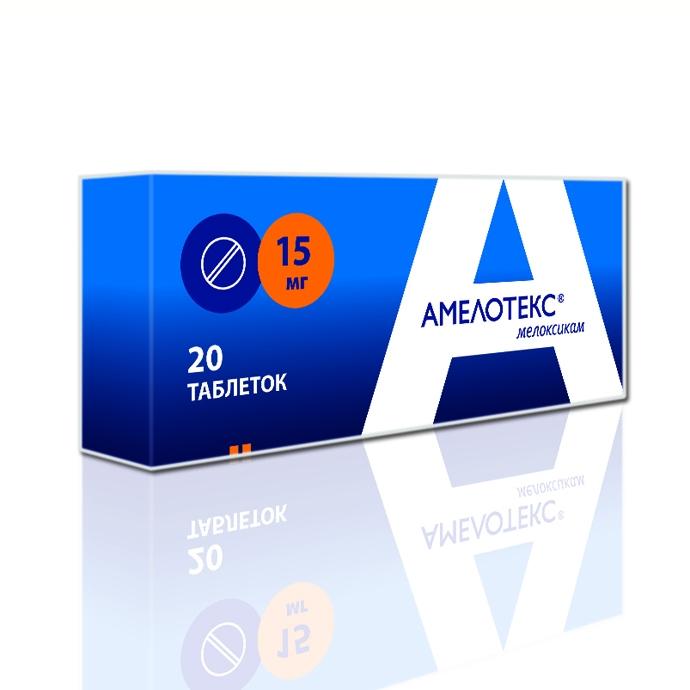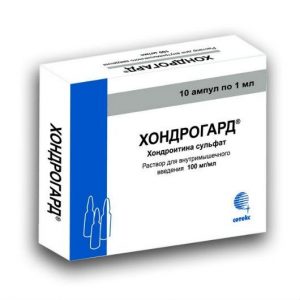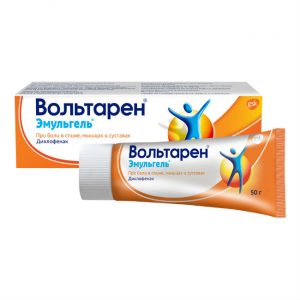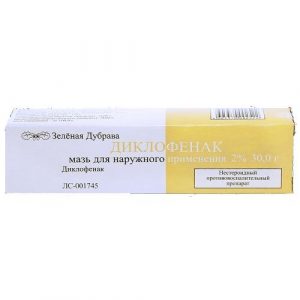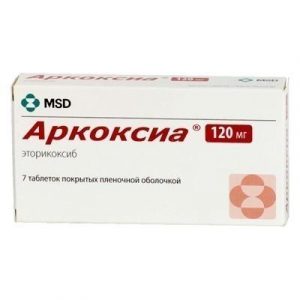Description
Release form
Tablets.
Packaging
20 pcs.
Pharmacological action
Amelotex – non-steroidal anti-inflammatory drug, has anti-inflammatory, antipyretic, analgesic effects.
Selectively inhibits the enzymatic activity of cyclooxygenase-2. Suppresses the synthesis of prostaglandins in the area of inflammation to a greater extent than in the mucous membrane of the stomach or kidneys. Less commonly, it causes erosive and ulcerative lesions of the gastrointestinal tract.
The enolic acid derivative belongs to the class of oxycams.
Indications
Rheumatoid arthritis osteoarthritis osteoarthritis ankylosing spondylitis (ankylosing spondylitis) is an inflammatory and degenerative joint disease accompanied by pain.
Contraindications
Hypersensitivity to the active substance or auxiliary components
Contraindicated in the period after coronary artery bypass grafting
uncompensated heart failure
Complete or incomplete combination of bronchial asthma, non-relapsing syndrome and non-relapsing syndrome h in history)
Erosive-ulcerative changes in the gastric mucosa or duodenum, active gastrointestinal bleeding
Inflammatory bowel disease (ulcerative colitis, Crohn’s disease)
Cerebrovascular bleeding or other bleeding
Severe liver failure or active liver disease
Severe renal failure in patients not undergoing dialysis (creatinine clearance less than 30 ml / min), progressive kidney disease, including confirmed hyperkalemia
Pregnancy, breastfeeding
Children under 15 years of age.
Caution
To reduce the risk of adverse events, the minimum effective dose should be used with the smallest possible short course for coronary heart disease, cerebrovascular disease, congestive heart failure, dyslipidemia / hyperlipidemia, diabetes mellitus, peripheral artery disease, smoking, creatinine clearance less than 60 ml / min anamnestic data on the development of gastric ulcer, in the presence of Helicobacter pylori infection, in old age, with prolonged use of non-steroidal anti-inflammatory drugs, frequent alcohol consumption, severe somatic diseases, concomitant therapy with the following drugs: anticoagulants (e.g. warfarin), antiplatelet agents ( e.g. acetylsalicylic acid, clopidogrel), oral glucocorticosteroids (e.g. prednisone), selective serotonin reuptake inhibitors (e.g. Imer citalopram, fluoxetine, paroxetine, sertraline).
Use during pregnancy and lactation
Contraindicated in pregnancy, during breastfeeding.
Composition
1 tablet contains meloxicam 15 mg.
Dosage and administration
The drug is taken orally with meals once a day.
Recommended dosage: – Rheumatoid arthritis: 15 mg per day. Depending on the therapeutic effect, the dose can be reduced to 7.5 mg per day.
– Osteoarthrosis: 7.5 mg per day. With inefficiency, the dose can be increased to 15 mg per day.
– Ankylosing spondylitis: 15 mg per day. The maximum daily dose should not exceed 15 mg.
In patients with an increased risk of side effects, as well as in patients with severe renal failure undergoing hemodialysis, the dose should not exceed 7.5 mg per day.
Side effects of the
From the digestive system: nausea, vomiting, belching, abdominal pain, constipation or diarrhea, flatulence, increased activity of hepatic transaminases, hyperbilirubinemia, stomatitis, erosive and ulcerative lesions of the gastrointestinal tract, colitis, perforation of the gastrointestinal tract, gastrointestinal bleeding (hidden or obvious), hepatitis.
From the nervous system: dizziness, vertigo, headache, tinnitus, confusion, drowsiness, disorientation, emotional lability.
From the respiratory system: bronchospasm.
From the hemopoietic organs: anemia, leukopenia, thrombocytopenia.
From the side of the cardiovascular system: peripheral edema, increased blood pressure, flushes of blood to the skin of the face and upper chest, palpitations.
From the urinary system: edema, hypercreatininemia, increased serum urea concentration. In rare cases, acute renal failure, interstitial nephritis, albuminuria, hematuria.
On the part of the sensory organs: conjunctivitis, visual impairment incl. blurred vision.
From the skin: itching, skin rash, urticaria, photosensitization, bullous eruptions, erythema multiforme, toxic epidermal necrolysis.
Allergic reactions: angioedema, anaphylactoid, anaphylactic reactions.
º °Ñ ÑÑ ² ½ ½ ¾ ² · ° ¸ ¼ ¾ ´ ¹ÑÑ ² ¸
Ñ ¸ ¾ ´ ½ ¾ ²Ñ ¼ ½ ½ ¾ ¼ ¿Ñ ¸ ¼ ½ ½ ¸ ¸ Ñ ´Ñ Ñ ³ ¸ ¼ ¸ ½ ÑÑ Ñ ¾ ¸ ´ ½ ¼ ¸ ¿Ñ ¾Ñ ¸ ² ¾ ² ¾Ñ ¿ ° » ¸Ñ »Ñ ½ ¼ ¸ ¿Ñ ¿ °Ñ °Ñ ° ¼ ¸ ( ° Ñ ° º ¶ Ñ °Ñ Ñ ¸ »Ñ ° » ¸Ñ ¸ » ¾ ² ¾ ¹ º ¸Ñ » ¾Ñ ¾ ¹) Ñ ² » ¸Ñ ¸ ² ° Ñ ÑÑ Ñ ¸Ñ º ² ¾ · ½ ¸ º ½ ¾ ² ½ ¸Ñ ÑÑ ¾ · ¸ ² ½ ¾-Ñ · ² ½ ½ Ñ ¿ ¾Ñ ° ¶ ½ ¸ ¹ ¸ ºÑ ¾ ² ¾Ñ Ñ ½ ¸ ¹ ¸ · ¶ »Ñ ´ ¾Ñ ½ ¾- º ¸Ñ Ñ ½ ¾ ³ ¾ Ñ Ñ ° ºÑ °. Ñ ¸ ¾ ´ ½ ¾ ²Ñ ¼ ½ ½ ¾ ¼ ¿Ñ ¸ ¼ ½ ½ ¸ ¸ Ñ ³ ¸ ¿ ¾Ñ ½ · ¸ ² ½ ¼ ¸ ¿Ñ ¿ °Ñ °Ñ ° ¼ ¸, ² ¾ · ¼ ¾ ¶ ½ ¾ Ñ ½ ¸ ¶ ½ ¸ ÑÑÑ ºÑ ¸ ² ½ ¾ÑÑ ¸ ´ ¹ÑÑ ² ¸Ñ ¿ ¾Ñ » ´ ½ ¸Ñ .
Ñ ¸ ¾ ´ ½ ¾ ²Ñ ¼ ½ ½ ¾ ¼ ¿Ñ ¸ ¼ ½ ½ ¸ ¸ Ñ ¿Ñ ¿ °Ñ °Ñ ° ¼ ¸ » ¸Ñ ¸Ñ ² ¾ · ¼ ¾ ¶ ½ ¾ Ñ ° · ² ¸Ñ ¸ ºÑ ¼Ñ »ÑÑ ¸ ¸ » ¸Ñ ¸Ñ ¸ Ñ ² » ¸Ñ ½ ¸Ñ ³ ¾ Ñ ¾ ºÑ ¸Ñ Ñ º ¾ ³ ¾ ´ ¹ÑÑ ² ¸Ñ (Ñ º ¾ ¼ ½ ´Ñ Ñ ÑÑ º ¾ ½Ñ Ñ ¾ »Ñ º ¾ ½Ñ ½Ñ Ñ °Ñ ¸ ¸ » ¸Ñ ¸Ñ ² ºÑ ¾ ² ¸).
Ñ ¸ ¾ ´ ½ ¾ ²Ñ ¼ ½ ½ ¾ ¼ ¿Ñ ¸ ¼ ½ ½ ¸ ¸ Ñ ¼ Ñ ¾Ñ Ñ ºÑ °Ñ ¾ ¼ ÑÑ ¸ » ¸ ² ° Ñ ÑÑ ¿ ¾ ± ¾Ñ ½ ¾ ´ ¹ÑÑ ² ¸ ¿ ¾Ñ » ´ ½ ³ ¾ ½ ° ºÑ ¾ ² Ñ ² ¾Ñ ½ÑÑ Ñ ¸ÑÑ ¼Ñ ( ¾ ¿ °Ñ ½ ¾ÑÑ Ñ ² ¾ · ½ ¸ º ½ ¾ ² ½ ¸Ñ ° ½ ¼ ¸ ¸ ¸ » ¹ º ¾ ¿ ½ ¸ ¸, ¿ ¾ º ° · ° ½ ¿ Ñ ¸ ¾ ´ ¸Ñ Ñ º ¸ ¹ º ¾ ½Ñ Ñ ¾ »Ñ ¾ ±Ñ ³ ¾ ° ½ ° » ¸ · ° ºÑ ¾ ² ¸).
Ñ ¸ ¾ ´ ½ ¾ ²Ñ ¼ ½ ½ ¾ ¼ ¿Ñ ¸ ¼ ½ ½ ¸ ¸ Ñ ´ ¸ÑÑ Ñ ¸ º ° ¼ ¸ ¸ Ñ Ñ ¸ º » ¾Ñ ¿ ¾Ñ ¸ ½ ¾ ¼ ² ¾ ·Ñ °ÑÑ ° Ñ Ñ ¸Ñ º Ñ ° · ² ¸Ñ ¸Ñ ¿ ¾Ñ Ñ ½ ¾ ¹ ½ ´ ¾ÑÑ °Ñ ¾Ñ ½ ¾ÑÑ ¸.
Ñ ¸ ¾ ´ ½ ¾ ²Ñ ¼ ½ ½ ¾ ¼ ¿Ñ ¸ ¼ ½ ½ ¸ ¸ Ñ ² ½ÑÑ Ñ ¸ ¼ °Ñ ¾Ñ ½ ¼ ¸ º ¾ ½Ñ Ñ °Ñ ¿Ñ ¸ ² ½ ¼ ¸ ÑÑ ´ÑÑ ² ° ¼ ¸ ² ¾ · ¼ ¾ ¶ ½ ¾ Ñ ½ ¸ ¶ ½ ¸ ÑÑÑ ºÑ ¸ ² ½ ¾ÑÑ ¸ ´ ¹ÑÑ ² ¸Ñ ¿ ¾Ñ » ´ ½ ¸Ñ .
Ñ ¸ ¾ ´ ½ ¾ ²Ñ ¼ ½ ½ ¾ ¼ ¿Ñ ¸ ¼ ½ ½ ¸ ¸ Ñ ° ½Ñ ¸ º ¾ ° ³Ñ »Ñ ½Ñ ° ¼ ¸ ( ³ ¿ °Ñ ¸ ½, Ñ ¸ º » ¾ ¿ ¸ ´ ¸ ½, ² °Ñ Ñ °Ñ ¸ ½), ° Ñ ° º ¶ Ñ Ñ Ñ ¾ ¼ ± ¾ » ¸Ñ ¸Ñ Ñ º ¸ ¼ ¸ ¿Ñ ¿ °Ñ °Ñ ° ¼ ¸ (ÑÑ Ñ ¿Ñ ¾ º ¸ ½ ° · °. Ñ ¸ ±Ñ ¸ ½ ¾ » ¸ · ¸ ½) Ñ ² » ¸Ñ ¸ ² ° Ñ ÑÑ Ñ ¸Ñ º Ñ ° · ² ¸Ñ ¸Ñ ºÑ ¾ ² ¾Ñ Ñ ½ ¸ ¹ ( ½ ¾ ±Ñ ¾ ´ ¸ ¼ ¿ Ñ ¸ ¾ ´ ¸Ñ Ñ º ¸ ¹ º ¾ ½Ñ Ñ ¾ »Ñ ¿ ¾ º ° · °Ñ » ¹ Ñ ² Ñ Ñ ² ° ¼ ¾ÑÑ ¸ ºÑ ¾ ² ¸).
Ñ ¸ ¾ ´ ½ ¾ ²Ñ ¼ ½ ½ ¾ ¼ ¿Ñ ¸ ¼ ½ ½ ¸ ¸ Ñ º ¾ » ÑÑ ¸Ñ ° ¼ ¸ ½ ¾ ¼, ² Ñ ·Ñ »ÑÑ °Ñ Ñ ²Ñ · ² ° ½ ¸Ñ ¼ » ¾ ºÑ ¸ º ° ¼ ° ÑÑ ¸ » ¸ ² ° Ñ ÑÑ ³ ¾ ² ² ´ ½ ¸ Ñ Ñ · ¶ »Ñ ´ ¾Ñ ½ ¾- º ¸Ñ Ñ ½ ¹ Ñ Ñ ° ºÑ .
Ñ ¸ ¾ ´ ½ ¾ ²Ñ ¼ ½ ½ ¾ ¼ ¿Ñ ¸ ¼ ½ ½ ¸ ¸ Ñ Ñ » ºÑ ¸ ² ½ ¼ ¸ ¸ ½ ³ ¸ ± ¸Ñ ¾Ñ ° ¼ ¸ ¾ ±Ñ °Ñ ½ ¾ ³ ¾ · °Ñ ² °Ñ ° Ñ Ñ ¾Ñ ¾ ½ ¸ ½ ° ² ¾ ·Ñ °ÑÑ ° Ñ Ñ ¸Ñ º Ñ ° · ² ¸Ñ ¸Ñ ¶ »Ñ ´ ¾Ñ ½ ¾- º ¸Ñ Ñ ½ Ñ ºÑ ¾ ² ¾Ñ Ñ ½ ¸ ¹.
Overdose
Symptoms: impaired consciousness, nausea, vomiting, epigastric pain, gastrointestinal bleeding, acute renal failure, hepatic failure, respiratory arrest, asystole.
Treatment: there is no specific antidote for overdose of the drug should be gastric lavage, activated charcoal (within the next hour), symptomatic therapy. Cholestyramine accelerates the elimination of the drug from the body. Forced diuresis, hemodialysis are ineffective due to the high association of the drug with blood proteins.
Storage conditions
In a dark place at a temperature of 8 to 25 ° C
Expiration
2 years.
Active ingredient
Meloxicam
Pharmacy terms
Prescription
dosage form
dosage form
tablets
